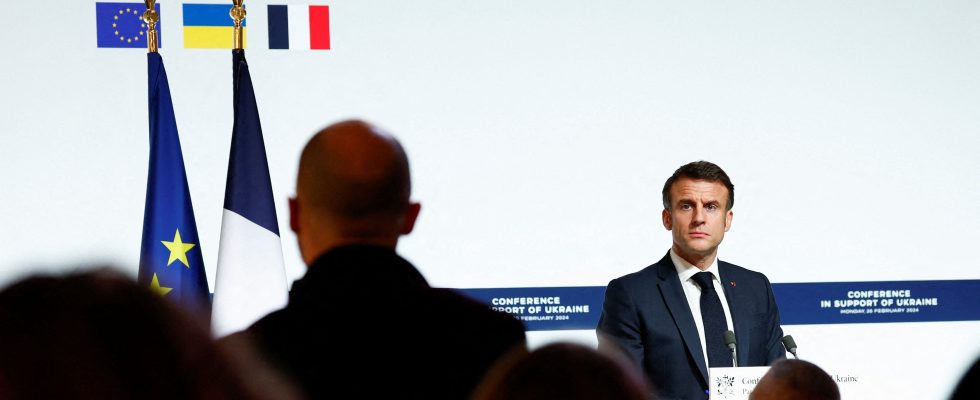Enthusiasm, curiosity, skepticism… Emmanuel Macron’s speech, this Monday, February 26, during the conference in support of Ukraine, sparked many reactions in the Western media, while around twenty international leaders were invited to the ‘Elysée for the occasion.
“This is the first time that there has been such an open discussion between states which collectively seek to provide troops to support the exhausted Ukrainian military manpower”, we welcome in The Guardian (center-left), the day after the meeting which was notably attended by the head of British diplomacy, David Cameron. “French officials were concerned that there was no single, galvanized Western force to respond to Vladimir Putin,” the British daily speculates.
This February 26, almost two years to the day after the start of the Russian invasion in Ukraine, the French president called on Western allies for a “start” to ensure the “defeat” of Russia. The creation of a “coalition for deep strikes” was announced in order to provide Kiev with “medium and long-range missiles and bombs”, but also the possibility of purchasing munitions outside Europe.
“The idea of purchasing hundreds of thousands of artillery ammunition in third countries for Ukraine […] was announced publicly for the first time by Czech President Petr Pavel, during the Munich security conference in mid-February”, recalls the Czech daily Lidovky (conservative). This Central European country would thus have the capacity to buy “up to half a million artillery shells of 155 millimeter caliber and 300,000 pieces of 122 millimeter caliber”, specifies the newspaper.
France has said it is ready to adopt this strategy, as have 15 other countries. For his part, the Dutch Prime Minister, Mark Rutte – “who has every chance of being appointed to the post of Secretary General of NATO”, according to the newspaper From Volkskrant (center-right) – mentioned a contribution from his country of “more than 100 million euros” to this Czech plan.
Lack of ammunition
Because it was urgent. In kyiv, Ukrainian President Volodymyr Zelensky suggested to his allies that he had “unfortunately” received only 30% of the “million shells that the European Union” had “promised” to Ukraine. The country, largely faced with a lack of equipment, is struggling to repel the Russian enemy. On February 17, Ukrainian forces had to withdraw from the town of Avdiivka, in Donetsk Oblast. This Monday, they announced their departure from the small village of Lastochkyné, in eastern Ukraine, which fell more than a week ago. Russian forces, for their part, claimed its capture.
“These decisions [de se retirer] are largely linked to the question of the lack of ammunition”, deplores The Kiyv Independent (liberal), which warns of a “catastrophic shortage of supplies, such as shells and air defenses within a few weeks”. Especially since on the other hand, Russian ambitions do not dry up. “The separatist region of Transnistria [petite république sécessionniste de Moldavie] could soon become the target of Russian efforts to fracture the West,” warns a journalist from Telegraph (conservative).
Western troops on Ukrainian soil?
These growing threats pushed kyiv’s allies to “break a taboo”, in the words of the Iberian newspaper El País (center-left). That of sending Western troops to Ukrainian soil. If there is no “consensus” on this decision, warns the French head of state, “nothing must be excluded”. An option mentioned in advance by the pro-Kremlin Slovak president, Robert Fico, to denounce it, believing that it would cause “an enormous escalation of tensions”.
On the United States side, Joe Biden was quick to react to the statements of his French counterpart. The American president “already has difficulty pushing Congress to accept military aid of 55 billion euros”, recalls the Dutch daily From Volkskrant. In this sense, Joe Biden must meet this Tuesday with Democratic and Republican leaders of Congress to move forward on this issue. “The Europeans seem more willing,” we concede in the New York Times (center-left). On the other hand, “nothing clearly says that Europe can replace the United States as the guarantor of Ukraine’s ability to fight.”
